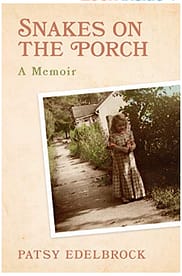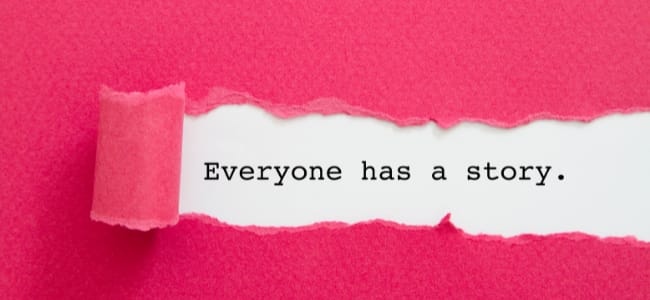What are your personal experiences? Do you have something to share with the world? Your blog can be a place both to express yourself and to make money.
Blogging is not only an excellent way to earn income, but it also provides a creative outlet for writers with things they want to say. There are many different blogs that people create about their lives or passions. The best part is that blogging takes no special skills or education - just type!
Throughout this site, Theo covers topics like how to create, support, and monetize your blog, but this post will focus on why you should feature your personal experiences.
If I have any authority to suggest this, it arises from my own blog, “WritetheStoryofYou.com” which I created solely to encourage everyone to think about writing their memoirs.
I was inspired to create that blog last year, after I edited the memoir of an 83-year-old woman, born in poverty in an Ohio farmhouse kitchen. She had a disability that would have driven many of us to an institution for life.
From the day she first stood in front of a mirror, she was determined to live life as normally as her siblings and other kids, despite having only one hand and arm to do it.
By sheer will power and determination, she learned to drive a tractor pulling machinery for her father; she rode her own brahma bull; she played trumpet in her High School marching band and graduated with honors. Then she earned a degree in chemistry at college and, after marriage and two children, spent forty years as a Medical Technologist, and trained others in the subject at a teaching hospital.

After we published her memoir, she spent the last four months of her life re-reading the 40,000 words of her book, all of which she had typed on her own computer (with her one hand) entitled "Snakes on the Porch."
Each reading gave her more release from the unhappy memories of her childhood and refreshed the happy memories of her 60-year marriage.
Mine is a one-man campaign to try getting everyone to preserve those details of their lives that make each of us unique. Historically, most of those details have been lost forever, simply because no one “bothered” to record them.
The two most common responses I get when chatting with those who have seen my blog are:
1. “But I’m not a writer . . .” and,
2. “Who would ever want to read about anything I’ve done?”
The first objection is easily defeated with the point that Hemmingway and Zane Grey weren’t writers either, until the day the day they first picked up a pencil and made a mark on a piece of paper. After that, writing can be just a downhill experience of daily learning and satisfaction with results.
On the second point, it isn’t as important who reads it as who writes it. The unique story of you will take on a life of its own once you begin. As you get underway, you can expect your story to become what the corporate world calls a “Performance Review.” The more you add, the more you will remember what comes next.
Why Writing About Your Personal Experiences Is Important
Personal experience essays are among the most popular ones out there. These pieces draw people in because they talk about feelings, thoughts, and emotions that many can relate to. People love reading them!
Your personal experiences can be a great source of inspiration for other people. When you write about your challenges, triumphs, and lessons learned in life, it could inspire someone else to keep fighting even though they may feel like quitting. It could give them the courage to continue working toward their dreams regardless of how discouraging things may seem.
People can see that even though you've been through difficult times, things eventually got better. They will learn from your story and apply it to their lives to overcome hardships of their own.
Writing about personal experiences is also a great way to support people struggling with similar issues or going through the same problems as you are.
Consider the number of your readers who were attracted to your blog, because they identified with something you've already written. These people may have experienced difficulties like yours and, when you talk openly about those difficulties, those readers become followers!
The Benefits of Writing About Your Personal Experiences
When you write about your personal experiences, it can be therapeutic. It's also good for your readers because they will enjoy reading about things that are familiar. One of the best ways to write is through personal experience. It's not only a great way to express yourself, but it also gives your readers an insight into who you are as a person.
The main benefit of writing about your experiences is that you can share your knowledge and help others. Maybe by showing how you've overcome a certain character flaw or problem, people facing the same challenge will have a role model they can relate to.
How to Blog About Your Personal Experiences
In a word, “Punctuate.” I’m not talking about adding periods and commas, I’m suggesting you punctuate the message of each post with examples that show how you have reacted to or experienced a situation you are describing. These “Stories,” while short, will leave a more lasting impression on the minds of your readers than anything else and they should be scattered throughout your posts – especially where emphasis is needed (e.g., in your “Call-to-Action”).
You may have noticed I "Punctuated" the first topic of this article with a recent experience editing a disabled girl's memoir last year. It was a short four paragraphs, but should have illustrated the point of the topic, before moving on to the next one.
Tips for Successfully Writing About Your Own Life
Which experiences you include, and how much detail you include depend on your blog post. Remember to use them as “stories-within-your-story,” to punctuate the text, and to illustrate the points you are making. What you reveal may take only a couple sentences, but I would recommend limiting it to no more than two paragraphs, usually. The keyword here is “usually.”
Your experience might easily be the theme of an entire article or post, in which case you may want to open with a brief mention of the incident, followed by a statement of its relevance to your reader, and some evidence supporting the fact.
Next, I’d add more detail of the experience, then wrap up with a picture of how your experience fits into your reader’s circumstance, and close with a summary, or a Call-to-Action (as per your goal in writing).
It's the same thing you see/hear on your local news broadcasts: A brief mention of stories in the headlines, a commercial, then one-by-one, each of those stories in more detail, interrupted by more commercials, then a Call-to-Action, “Tune in for more on tonight’s news at nine . . .”
Common Pitfalls when Sharing your Personal Stories Online
I wouldn’t suggest there is a danger in writing about your experiences, if you look closely at your final draft to be sure you have included nothing libelous. Commenting about others by name is usually OK if you have obtained their permission, or if what you have said about them is verifiably true and accurately said. That is not meant to be legal advice, just a guideline for when you might be mentioning another person or entity in your post.
Common sense should tell you not to disclose personal information as you recount your experiences. Your address, your phone number, and other contact information can easily be left out of your content, unless your goal is to have your readers contact you for commercial reasons.
I’m happy to tell my readers I live in the Ozarks, but that’s not enough for them to add me to their Christmas card list.
Conclusion
This article has given you the tools and knowledge to blog about your personal experiences with success. You can easily use this content for a blog post, social media share, or even an email newsletter! We hope that by sharing these tips with you, we have helped make it easier for you to find what works best for you in writing your own blog posts.
Jim McCarthy is a freelance Content Writer, Copyeditor, Proofreader and Ghostwriter, specializing in Blog Content at JMcontent, LLC, in the Missouri Ozarks. He and his team can be hired for simple gigs or long-term projects, at https://JMcontent.com


